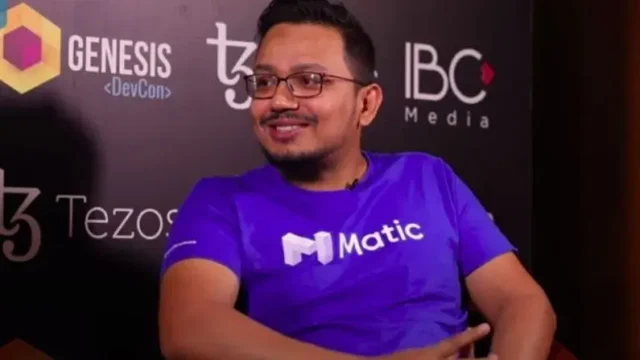It takes great determination and hard work to turn one’s life around in a complete 180 degree. One such inspiring story is that of Sandeep Nailwal, an Indian entrepreneur who went from an extremely humble beginning to being counted among India’s first crypto billionaires.
Sandeep co-founded Polygon Labs, an international software development company that builds blockchain scaling infrastructure.
The company was founded in 2017 and is a “layer 2 blockchain-based platform for application development”.
However, beyond that, it is Nailwal’s story from where he began and where is now that is nothing short of a movie.
What Is The Story Of This Indian Entrepreneur?
Sandeep Nailwal was born in the small village of Ramnagar, Uttarakhand by a midwife. According to reports, he was a breech baby, meaning he didn’t instantly cry after being born and there was the fear that he didn’t survive the birth. His family moved to East Delhi’s Shakarpur when he was five and they lived in a makeshift home on a rooftop for some time there.
He didn’t go to school at the usual age kids do as his parents hadn’t thought about it. It was only when a neighbour, who ran a school called Amar Bharti in their locality with 15-20 students inquired with his parents that they enrolled him in one. As per a TOI report, due to this Sandeep was older than his classmates by 2 years.
Sandeep also took up a part-time job in the 6th class, teaching 2nd and 3rd-class students for Rs. 300 a month. This was to help his family financially since his father struggled with a drinking and gambling addiction.
In one incident he even added the cost of a computer to a student loan he applied for, however, that money was used to pay off one of his father’s loans instead.
In a report by YourStory Sandeep said, “I was born to a poor, peasant farmer family in Ramnagar, Nainital, and we migrated to Delhi. Living in that ghetto-like environment, it was customary for members from poor families like ours to work menial jobs. In fact, my grandfather worked as a house help.”
He also said, “The determination to win, build a better life and become a big man came from a place of pain and suffering. I had several examples in my own family and community of the kind of man I did not want to be. Many people in the community also stopped treating me with dignity when they learned of my father’s problems.”
Although Sandeep did not do well in the IIT-JEE exams, he did complete his B.Tech at Maharaja Agrasen Institute of Technology, affiliated with Guru Gobind Singh Indraprastha University.
He then did his Master of Business Administration (MBA) in Finance and Supply Chain Management at the National Institute of Industrial Engineering or NITIE Mumbai.
Read More: ResearchED: How Come The World Never Thought Of UPI Before India Did?
Upon graduating in 2010 he got a job at Deloitte as a consultant, moving on to the Welspun Group’s e-commerce division as their chief technology and supply chain officer.
Sandeep was constantly working part-time in various startups during this time though. He launched ScopeWeaver in 2019, a “marketplace for professional services” and soon after caught the AI, crypto, and blockchain bug.
Although he’d known about Bitcoin since 2013, he’d initially thought it was a scam, however, the more knowledge he gained about it the more interested he got. He was also given a push by his then-girlfriend and now-wife Harshita to go for his dreams.
Sandeep said, “It was cliche that I thought I needed to buy a house, because it was customary for a man to own a home so he could get married. My now-wife told me it was okay to forget about owning a home, and said it was fine if we lived in a rented home. She urged me to pursue my entrepreneurial dreams.”
Another pivotal moment came when he became acquaintances with Jaynti ‘JD’ Kanani, who was then a data scientist at Housing.com and together they realised that the Ethereum blockchain had a weakness.
In a 2021 interview with Livemint, Nailwal also explained how the company came to be “My co-founders and I came up with the proof of concept in 2017. By April 2018, we set up the company and raised some small funds from friends and family and started building the product. That round was just $150,000.
After that, we did another small round of around $500,000. After that, we did an initial exchange offering with Binance, where we raised $5 million. In the initial few years, I started building the ecosystem in India.
The whole environment around cryptocurrency was unfavourable. Developers were afraid of legal hassles. You see, we are a tech platform, and we don’t build apps ourselves. People build apps on top of our platform.
Community building is thus very important. We did a lot of hackathons in India—in the last 2 years, we must have done 200-300 hackathons in colleges and other places. We use India as a strength rather than a weakness.”
Sandeep also pointed out the difficulty Indian startups have in raising funds, stating “People who studied in Stanford and other top colleges were still able to raise funds. There was a perception that Indians couldn’t build software infrastructure companies. Folks in the industry referred to Indian founders like us as ‘pajeets’ – a derogatory and ethnic slur.”
Eventually, the company’s three founders, Jaynti Kanani, Sandeep Nailwal, and Anurag Arjun, also became India’s first crypto billionaires after its native token, Matic, went from $26 million in 2019 to over $14 billion in 2021. According to reports, the company currently stands at a valuation of $20 billion.
Image Credits: Google Images
Sources: TOI, Livemint, Your Story
Find the blogger: @chirali_08
This post is tagged under: Indian Entrepreneur, Entrepreneur, Polygon founder, Sandeep Nailwal, polygon, blockchain, first crypto billionaire India, Sandeep Nailwal polygon, Sandeep Nailwal entrepreneur
Disclaimer: We do not hold any right, or copyright over any of the images used, these have been taken from Google. In case of credits or removal, the owner may kindly mail us.
Other Recommendations:
Here’s Why Young Student Entrepreneurs Are Winning With Their Small Businesses



































